MEDIA FOR CHANGE NETWORK
EACOP Project: A displacement crisis and cultural erosion threatening Ugandan communities.
Published
1 year agoon

By Witness Radio and Südnordfunk teams.
Thousands of people in Uganda are affected by the East African Crude Oil Pipeline (EACOP) project, which spans from the oil production towers and refineries to the pipeline’s route and extends to its final destination in Tanzania. The Ugandan government portrays it as a promising project for the country’s development, often labeling those who criticize it as agents of imperialism.
The French oil company Total Energies wants to build a pipeline in Uganda and Tanzania. EACOP project was first introduced in Nanywa ‘A’ village, Nanywa Parish, Ndagwe sub-county in Lwengo district in around 2018. Back then, hundreds of people hoped to benefit from it.
In several meetings conducted by Total to introduce the project to the affected communities, such as those in Lwengo District, the Total Energies team communicated that the project would offer enhanced support to vulnerable groups, including widows, the elderly, persons with disabilities, and orphans.
“Total often called us into their meetings, where they assured us that everyone would benefit from the project, with particular attention given to groups such as widows, orphans, and the elderly.” One of the affected residents, Mr. Katoogo Kasim, told Witness Radio.
Accordingly, the impacted communities mentioned that the project was highly hyped by its implementers as a pathway to development and wealth generation. But what turns out are regrets and curses from the would-be beneficiaries of the Eacop project. In areas where the project is passing, they claim it has exposed them to poverty, adversely affected their health, criminalized project critics, and greatly affected their social lives and cultures.
90-year-old Tereza Nakato (name changed) of Nanywa, a village nine kilometers from Lwengo town, suffers from high blood pressure. According to her, her health has been deteriorating daily since the project implementors expressed interest in her land. Before the project, she was living happily and enjoying her old village life.
“A lot has changed in my life ever since these oil people came and took my land. The pipeline now passes through my compound, just three meters from my house, and this has caused me to develop hypertension due to the constant stress of worrying about what might happen next,” the 90-year-old woefully revealed.
During our visit to her home, a brick-structured four-roomed house surrounded by a small farm of two cows and goats, she was still locked in her house by 9 am when we reached there. Next to her home is her son’s house, which is also on the same land. He, too, is affected by the EACOP. Due to her illness, the old widow could not speak much, so her son, Mr. Katoogo Kasim, assisted her in talking to us. The EACOP is supposed to pass right through her compound. The construction work has not yet begun, but signs of its beginning can be witnessed.
Katoogo Kasim told us that the pipeline is located just three meters from his mother’s house. The three meters between the pipeline and the house will be the compound, leaving her with no space to do her chores.
She (Nakato) worries that her house may be damaged due to heavy trucks and machines that will construct the pipeline, and the poor compensation stresses her. Along with other effects, it has worsened her health. For instance, her family has to spend more than 50 Euros every month on her medication – money she does not have. She received some compensation for the land taken for the project. But she says it was inadequate to improve her life. Instead, it is used up quickly by her sickness.
“This project is a disaster, bringing havoc to me and my family. It’s the time when my mother got sick, and all the money that was given to her as compensation was used up for her monthly Hypertension medication,” Kasim further said.
According to Nakato, initially, Total told her that she would be relocated elsewhere or that they would construct a new house. But these were empty promises well-intentioned to coerce her to surrender her land to the project. When she sought relocation or construction of a new home due to the imminent impact on her and her house after giving them her land, the project implementers told her that it must first get cracked or fall.
Nakato is not the only one to cry out about the impacts of the EACOP project on her land and home. Lawyer Brighton Aryempa is advising affected community members and representing some of them in court. In an interview with Südnordfunk, he, too, says that being displaced from their land is one of the significant impacts on the communities:
“Communities are suffering because they are being displaced from their ancestral land without compensation, and even when they pursue legal action. The court cases have dragged on for years, yet land is crucial for creating livelihoods for families and communities. This is happening despite laws outlining how land should be compensated when taken for public interest.” He said.
While the government is allowed to acquire land for public interest, the acquisition should follow due process. This has often been different for the EACOP project. He emphasizes that community members have the full right to demand adequate compensation:
“Some people think the government compensating them is just helping them, which is untrue. These are inherent rights. So, we want them to know some of these basics so that they can negotiate. They can have better compensation rates and are not cheated,” he added.
Similar concerns about injustices caused by the project are echoed in the neighboring Kyotera district. Residents report a feeling of powerlessness. They are being told they must surrender their land for the project and accept the compensation offered, as it is a government initiative that cannot be halted. Likewise, the landlords too are complaining.
Uganda has four land tenure systems under which a person can hold land: mailo, freehold, leasehold, and customary. In these particular areas of Kyotera, most of the project-affected persons live on the Mailo land tenure system. Here, the landlord owns the land, while tenants may have rights to use the land but lack full ownership unless granted by the landlord through purchase with a land title.
Mr. Ssekyewa Benedicto is a landlord in Lusese village in Kyotera district. The entire village survives mainly on agriculture. We found coffee, maize, and bananas growing during our visit to his home. Ssekyewa says about seven of his tenants were affected by the pipeline. He blames the government and the project implementers for not educating him and other affected people about the project’s adverse effects.
‘We lack complete information about how this project will be conducted. This project was introduced to us without proper education or consultation,” he stated.
As a landlord, Ssekyewa claims he has not benefited from the project as promised. He says he was never consulted or informed about how the valuation of his land was conducted. “We were not informed as owners of the land that this is what we are to be compensated or what was valued from our land because the government isn’t clear on the exact valuation,” he maintained.
In the same village, Ssalongo Kigonya Vicent was promised compensation for his two pieces of land affected by the pipeline project. Still, he received less than the amount that was initially valued. He said he was made to sign a large sum of money on a document over 30 pages long, written in English—a language he did not understand. “I signed 28 million (about 6,916.98 Euros) for two plots of my land where the project passed, but to my surprise, I received only 3,800,000sh, equivalent to 938.73 Euros on my account.” He revealed.
For now, he still has his house on part of the land that was left. But where his crops are, construction will soon be taking place. He reveals that. “I was told that no one can stop the government from implementing a pipeline project. They said they can do it wherever they want.”
Lawyer Aryampa points out that the compensation is often too little. He mentions that government agencies take the value of land from years back but only pay it later when a piece of land is worth much more.
Besides compensation, Mr. Kigonya faced another challenge. One of his pieces of land accommodated the grave sites of his deceased twins, requiring their exhumation and relocation. Total supported the relocation of the graves and promised to support ceremonies after relocation, including celebrations of twin rituals.
In the Buganda culture of the Buganda kingdom, where Kigonya belongs, one has to perform twin rituals celebrating their birth and celebrate twin rituals if the graves of twins are exhumed or relocated due to cultural beliefs and traditions associated with them. In the same culture, twins are considered sacred and hold a special spiritual significance. When twins pass away, their graves are typically treated with relevance, and the relocation or disturbance of these graves can be seen as disrupting spiritual harmony and traditional practices. The Baganda performs specific rituals after the graves are exhumed or relocated to restore this harmony and honor the twins’ spirits.
But up to date, the rituals of Kigonya’s twins remain unperformed. The project implementers did not fulfill their promises, and the father had no means for it alone. According to his conviction, not performing these rituals is exposing his family to significant consequences, including poverty, family separations, and body burns.
Not far from Kigonya’s home is Mr. Bwowe Ismail’s in Bethlehem village, a father of 20 children. His family is living in misery after the project grabbed his entire land without compensation. When he demanded to be compensated fairly, state authorities intimidated, arrested, and charged him with false offenses, claiming he was sabotaging the government project.
In Uganda, criminalization is one tactic used by multinational companies, the government, or its bigshots to silence community land and environmental defenders and project critics for raising the adverse impacts on projects being established.
Bwowe, on one of the cases, was arrested and slapped with charges of robbing a confident, wealthy man. Total offered to lend him support with legal fees and representation in court only if he allowed to sit with them at the table and accept the compensation. But Bwowe refused.
Many individuals affected by this project are dissatisfied but cannot voice their complaints because it is a government project, and they witness how their neighbors are intimidated. Mr. Segawa Abdallah, Chairman of an affected village in Nanywa A, confirmed this sentiment, adding that they resorted to keeping this pain in their hearts.
Related posts:

 The East African Court of Justice fixes the ruling date for a petition challenging the EACOP project.
The East African Court of Justice fixes the ruling date for a petition challenging the EACOP project.
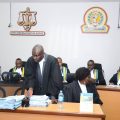 The East Africa regional court dismisses a case challenging the construction of the EACOP project.
The East Africa regional court dismisses a case challenging the construction of the EACOP project.
 Breaking: Eight (8) environmental activists have been arrested by police over protesting against the EACOP project.
Breaking: Eight (8) environmental activists have been arrested by police over protesting against the EACOP project.
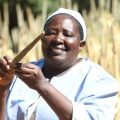 ‘Her land, her rights’ a remedy for climate crisis
‘Her land, her rights’ a remedy for climate crisis
You may like
MEDIA FOR CHANGE NETWORK
Women environmental rights defenders in Africa are at the most significant risk of threats and attacks – ALLIED New report
Published
18 hours agoon
January 23, 2026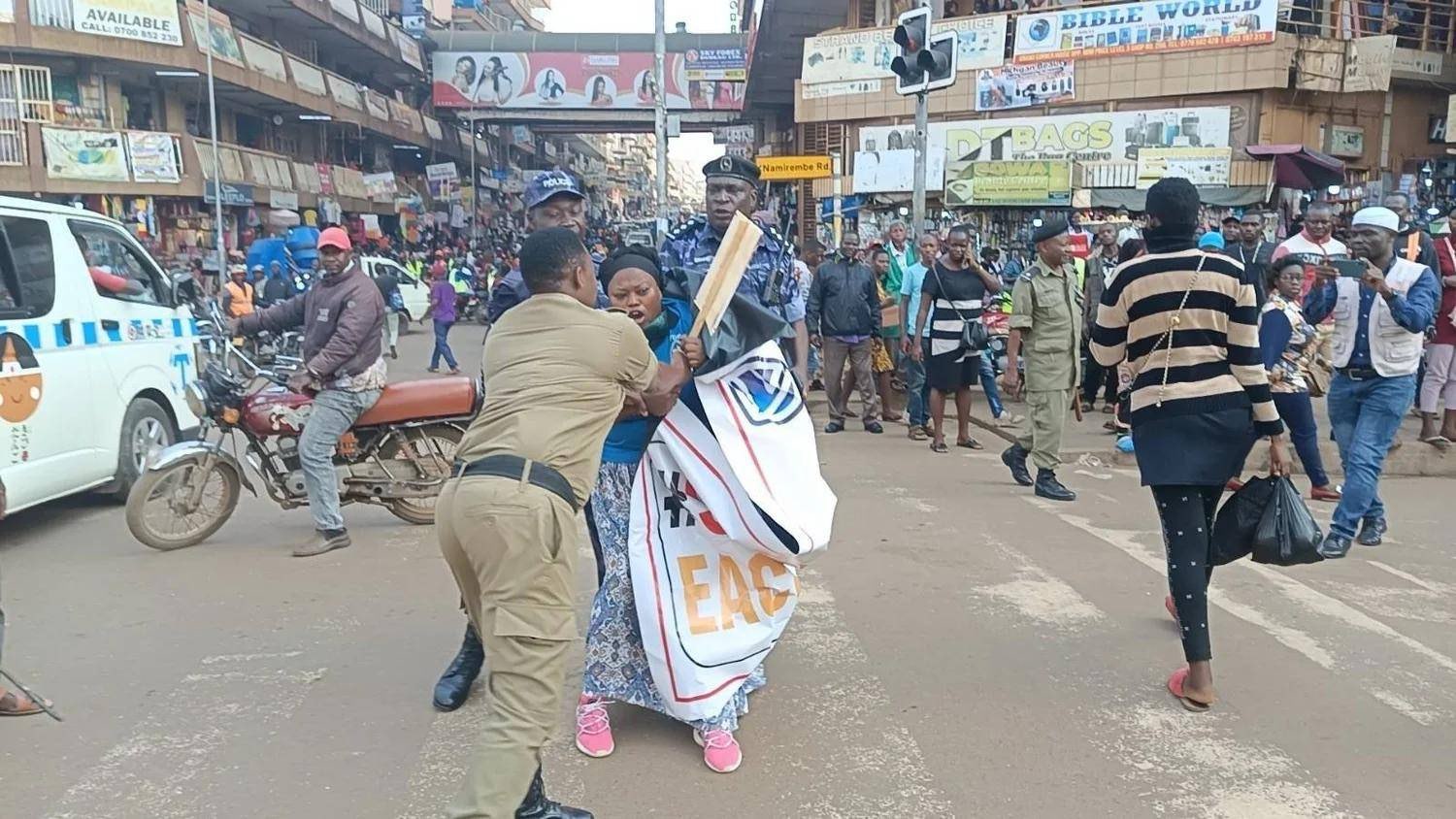
By Witness Radio Team
As land and environmental rights defenders face ongoing threats for protecting community land and territories affected by development projects, a new trend shows attacks increasingly targeting women defenders.
According to the latest research report by Natural Justice, based on data from the ALLIED Coalition, women land and environmental defenders accounted for 6% of all documented cases between 2022 and 2025.
In its recent report titled ‘The Situation of Women Environmental & Human Rights Defenders Across Africa,’ released in December 2025, a total of 261 attacks targeting land and environmental rights defenders across all countries since 2022 were recorded, highlighting the urgent need for policy change to protect women defenders better better better and sustain their vital roles.
“Across Africa, women environmental and human rights defenders (WEHRDs) are standing at the frontlines of the fight for land, water, and climate justice, and they are paying a steep price for their courage. From Kenya to the DRC, Uganda to South Africa, women activists confront not only repression but also deeply rooted patriarchal norms,” the report reads, aiming to inspire resilience and collective action.
Mary Mwangi, a land and environmental rights defender in Kenya, has been arrested more than eight times since 2020 for defending her community along Kenya’s coast against pollution, caused mainly by industries operating along the Mombasa highway in Nairobi.
“I’ve been facing numerous trumped-up charges since 2020 by the state on behalf of a private oil recycling company. The company is located right in the middle of a residential area where around 2,000 people live,” the woman defender reveals.
According to her testimony, the company began operations in 2019 without following due process and in violation of Kenya’s Environmental Management and Coordination Act. The company’s activities, including the delivery of used oil, its pre-treatment, and its refining into specific products, have had severe negative environmental impacts on residents.
“I was one of the residents who raised environmental concerns with company management, but no action was taken. The plant was operating against the will of the people, as there was no public participation in its development. Toxic gases were produced, endangering both human and livestock health and lives. The plant releases sulphuric acid, which is highly corrosive and has caused severe skin burns within the community,” she adds.
According to Mwangi, instead of addressing the concerns raised, the company’s response has been brutal, extending to her family and several community members through harassment, intimidation, arrests, and trumped-up charges.
“The company management conspired with local police in a series of harassment and intimidation campaigns that resulted in arrests and fabricated charges targeting residents, particularly families championing community rights. I was among the first to be targeted because I mobilised the community. There are currently four cases in court involving me, my family, my husband and children, and a few community members supporting this struggle.”
Beyond the legal harassment, Mwangi says her movements have been restricted, and she continues to face threats to her life.
“I cannot move freely because my movements are being monitored by company management. The biggest threat I face now is fear for my life and that of my family. There are compelling individuals within government who have openly shown they will stop at nothing,” she says.
Such conditions, once more commonly faced by male defenders, are increasingly affecting women as well. Mary is not alone; many other female defenders are falling prey to powerful multinational corporations and governments intent on grabbing community land for harmful projects.
Women defenders face disproportionate risks, including gender-based violence, criminalisation, intimidation, and exclusion from decision-making processes. Despite their critical contributions, their experiences of WEHRDs are often overlooked, their voices sidelined, and their struggles underreported.
“They endure smear campaigns, sexual violence, online abuse, and many other abuses for daring to challenge power. Many are targeted precisely because they are women, with their gender weaponized to silence their voices and discredit their leadership,” the report adds, emphasizing the threats women defenders face and the need for protective measures.
According to ALLIED Coalition data, of the 261 attacks reported, 18 targeted women, compared to 88 against men, with 70 cases categorized as unknown or unspecified, emphasizing the urgent need for protective measures for women defenders and a clearer understanding of the scale of the crisis.
Uganda—often referred to as the Pearl of Africa—has emerged as a hazardous zone. The report shows that 94 cases were reported from Uganda, followed by the Democratic Republic of Congo and Tanzania, each accounting for around 15% of attacks, with 35 and 34 cases, respectively.
“Environmental activists have been particularly targeted by the Ugandan government, with the most high-profile cases involving protests against the East African Crude Oil Pipeline (EACOP).
Physical attacks and threats against environmental human rights defenders have escalated, with no indication they will subside. These acts are perpetrated by both government officials and representatives of oil companies,” the report notes.
The most frequent category of attacks recorded was “threats or other harassment” (33 cases or 18%), indicating sustained intimidation short of overt violence. Arbitrary arrest or detention accounted for 16 cases (9%), physical attacks for 15 cases (8%), and death threats for 13 cases (7%), underscoring the persistence of criminalisation and direct violence. A smaller number of entries (9 cases or 5%) involved non-violation-related support such as solidarity or medical aid, suggesting limited preventive or recovery-oriented interventions.
A third of the cases were linked to the fossil fuel industry (oil and gas), with mining and energy accounting for 25 and 23 attacks, respectively.
Across Africa, land continues to be targeted by corporate interests from the West, often branding themselves as developers or job creators. African governments, in turn, allocate vast tracts of land to these companies, much of it traditionally used by Indigenous or local communities.
For years, the continent has been shaped by the misleading narrative that Africa possesses vast, vacant, or underutilised land awaiting transformation into industrial farms or profitable carbon markets.
However, a 2025 report by the Alliance for Food Sovereignty in Africa (AFSA), Land Availability and Land-Use Changes in Africa, dismissed this narrative. Drawing on satellite data, field research, and interviews with farmers across the continent, the study revealed that Africa’s landscapes are far from empty.
“Much of the land labelled as ‘underutilised’ is, in fact, used for grazing, shifting cultivation, gathering wild foods, spiritual practices, or forms part of ecologically significant systems such as forests, wetlands, or savannahs,” the report stated.
In conclusion, the Natural Justice report calls on African states to recognise and protect WEHRDs by adopting national laws and policies that explicitly acknowledge their role and the state’s duty to protect them. This includes meaningful consultation with civil society and alignment with the UN Declaration on Human Rights Defenders and the African Commission on Human and Peoples’ Rights.
It further calls on African governments to tackle the drivers of harm against WEHRDs by protecting land and environmental rights, ending criminalisation and harassment, and preventing and addressing gender-based threats and violence. Ensuring the recognition and protection of women defenders and their communities remains critical.
Despite the stress and fatigue caused by her work, Mary Mwangi remains committed to the struggle.
“I will continue the work and try new strategies. We are considering organising and implementing projects around environmental rights as a tool for environmental justice. If communities are well sensitised and understand their rights, they may support the struggle. That would also help reduce the risks faced by my family,” she concludes.
Related posts:

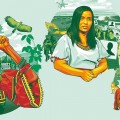 Defending tomorrow: The climate crisis and threats against land and environmental defenders
Defending tomorrow: The climate crisis and threats against land and environmental defenders
 Human rights defenders show remarkable courage in the face of attacks and killings – new report
Human rights defenders show remarkable courage in the face of attacks and killings – new report
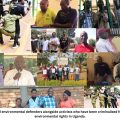 Criminalization of planet, land, and environmental defenders in Uganda is on the increase as 2023 recorded the soaring number of attacks.
Criminalization of planet, land, and environmental defenders in Uganda is on the increase as 2023 recorded the soaring number of attacks.
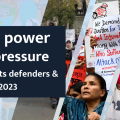 Breaking: Over 600 attacks against defenders have been recorded in the year 2023 globally- BHRRC report.
Breaking: Over 600 attacks against defenders have been recorded in the year 2023 globally- BHRRC report.
MEDIA FOR CHANGE NETWORK
Uganda moves toward a Bamboo Policy to boost environmental conservation and green growth.
Published
3 days agoon
January 21, 2026
By Witness Radio team.
Uganda’s move to develop a national bamboo policy aims to boost environmental conservation and create green jobs, addressing the country’s urgent unemployment issues among the working class.
Bamboo is a critical tool in fighting climate change due to its rapid growth, high carbon sequestration capacity, and ability to produce 35% more oxygen than equivalent trees. As a fast-growing, renewable resource, it restores degraded land, provides sustainable materials that replace emission-intensive products like concrete, and offers a resilient, low-carbon bioenergy source.
Bamboo’s potential is outlined in the existing National Bamboo Strategy. Still, stakeholders stress that a formal policy involving entrepreneurs, farmers, and processors is essential to remove regulatory uncertainty and foster sector growth.
“The strategy is a good document, but it was developed largely through desk research. It did not fully involve entrepreneurs, farmers, and processors who are already working in the bamboo industry,” said Sjaak de Blois, chairman of Bamboo Uganda, encouraging stakeholders to see their role as vital.
The bamboo policy is currently at an early consultative stage, with no draft yet submitted to the cabinet or parliament. Recent consultations brought together representatives from eight government ministries, private-sector bamboo actors, and development partners to begin aligning the strategy with practical regulatory needs.
“What we have now is the starting point,” De Blois mentioned. “The next step is to take the strategy and make it more practical, more market-driven, and more Ugandan. The next step is to move from having a plan to adopting a policy.
Bamboo currently falls under several regulatory frameworks, with no single authority overseeing the sector. The policy push is being driven in part by Bamboo Uganda, a membership-based organization bringing together bamboo farmers and processors, among others. The organization aims to play a coordinating role similar to that historically played by the Uganda Coffee Development Authority in the coffee sector.
“If you want to make a sector meaningful for a country, you need coordination. Coffee became what it is because of an institution that aligned farmers, traders, exporters, and regulators. Bamboo needs the same kind of coordination.” He said.
The policy process is supported by the Belgian development agency, which is funding consultations and facilitating dialogue between the government and the private sector.
Industry players say the absence of clear regulations has constrained investment despite growing demand.
“At the moment, bamboo is everywhere and nowhere at the same time. As a farmer, you talk to forestry, as a charcoal producer, you talk to energy, as a builder, you talk to works. There is no single framework that enables the industry to function.” De Blois added.
Supporters of the policy argue that bamboo could play a significant role in environmental conservation. Bamboo grows rapidly, regenerates after harvesting, and can be harvested annually for decades, reducing pressure on natural forests.
According to Global Forest Watch (GFW), Uganda lost 1.2 million hectares of tree cover between 2001 and 2024, representing a 15% decline from the 2000 baseline. Bamboo has been identified as a key species for restoration.
“One acre of bamboo that is harvested sustainably can prevent the destruction of hundreds of acres of natural forest,” De Blois said. “If we get this right, bamboo can help reverse deforestation rather than contribute to it.”
Ms. Susan Kaikara, from the Ministry of Water and Environment, emphasized bamboo’s potential to drive Uganda’s green-growth agenda.
“Establishing a coherent national policy framework will strengthen coordination, inspire investment, and unlock bamboo’s full potential as a pillar of Uganda’s green economy,” she said.
Uganda’s charcoal market alone is estimated to be worth hundreds of millions of dollars annually, much of it supplied through unsustainable wood harvesting. Industry actors say certified bamboo charcoal plantations could offer a cleaner alternative.
“If they allow us to certify bamboo charcoal plantations, then we can get a trade license to compete or to work together with the existing market. We will reverse deforestation. We would enter an industry of about 500,000 hectares, creating smart, green jobs. We can digitalize them to make them attractive through bamboo agroforestry. So again, those things need a policy.” He adds.
Bamboo is also viewed as a climate-friendly crop due to its high capacity for carbon sequestration. Its rapid growth enables it to absorb large amounts of carbon dioxide, while its extensive root system improves soil structure and increases long-term carbon storage.
“When you look at carbon sequestration, bamboo offers several advantages. Residues from harvested bamboo can be converted into biochar, locking carbon into the soil for long periods. When you also see the sequestration per acre compared to many other trees, it is five or six times higher. So, we sequester a lot,” De Blois said
Stakeholders say that if the policy process progresses as planned, bamboo could emerge as one of Uganda’s key green growth sectors within the next decade.
“Policy making takes time. But what is important is that we have started the conversation with all the right ministries in the room. From here, it is about taking steady, practical steps.” He concluded.
Related posts:

 As Uganda awaits the Energy Efficiency and Conservation law, plans to develop a five-year plan are underway.
As Uganda awaits the Energy Efficiency and Conservation law, plans to develop a five-year plan are underway.
 REC25 & EXPO Ends with a call on Uganda to balance conservation and livelihood
REC25 & EXPO Ends with a call on Uganda to balance conservation and livelihood
 Africa’s growth lies with smallholder farmers
Africa’s growth lies with smallholder farmers
 Green Resources’ forestry projects are negatively impacting on local communities – donor
Green Resources’ forestry projects are negatively impacting on local communities – donor
MEDIA FOR CHANGE NETWORK
Will Uganda’s next government break the land-grabbing cycle?
Published
2 weeks agoon
January 13, 2026
By Witness Radio team
Uganda has experienced persistent land evictions for decades. However, some actors are increasingly deliberating on how to ensure people have land tenure security. As the country heads into another general election on Thursday, the 15th of this month, land has once again emerged as one of the most emotionally charged and politically sensitive issues during the campaigns.
From the Kiryandongo land grabs involving multinational companies to the Amuru land wrangles, and from Bunyoro’s oil-rich fields to increasing evictions in the Buganda (Central) sub-region of Uganda, stories of land grabbing and displacement continue to dominate public debate and news headlines, especially during presidential campaigns. Every election season brings renewed promises from political actors to end land injustice.
According to the 2024 Police Annual Report, 397 land-related criminal cases were recorded, up from 271 in 2023, underscoring the urgent need for systemic solutions to address this escalating crisis.
Land grabbing in Uganda often leaves communities landless and powerless, which should evoke empathy and motivate the citizenry to seek justice and systemic change.
Mr. Ulama Dison Duke Ukerson will take decades to forget how his land, which he invested all his savings in, was forcibly seized by the Uganda Peoples’ Defense Forces (UPDF), a national army.
“The UPDF has taken over my land. They occupied it and are now using my six buildings. I had constructed them for my piggery and poultry farming project on my five acres of land,” he revealed in an interview with Witness Radio.
The chief is among hundreds of people in the Koch community living in distress after the alleged grabbing of clan land by the Uganda Army in March 2020, which seized approximately 100 acres of land used by the community for over 150 years without consultation or compensation, illustrating the widespread injustice faced by vulnerable communities.
“People are suffering, and no one has compensated us. We just woke up one day to see the army forcefully taking our land. I first heard about the soldiers’ presence from the chairman. By then, they had already broken into my manager’s house,” he added.
Although he is the traditional chief of the Pangero Clan, this did not stop those in power from grabbing his land. The land taken covers three villages: Aleikra, Kochi Central, and Panyabongo in Koch Parish, Nebbi District, belonging to the Pangero clan. Despite the years passing by, the Pangero Chiefdom remains in uncertainty and hardship.
Across Uganda, many communities face evictions, and presidential candidates’ acknowledgment of this nationwide concern can inspire Ugandans to use this opportunity to push for concrete actions and hold leaders accountable for real change.
Manifestos full of promises.
Major political parties contesting for power acknowledge the gravity of the land crisis and have placed solving the problem prominently in their manifestos. Other aspirants have promised not only to stop land grabbing but also to reinstate displaced people on their land.
The Forum for Democratic Change (FDC) promises legal reforms, including a review of the Constitution and the Land Act, simplified registration of customary land, stricter controls on notable land titles, faster resolution of land cases in courts, enforcement of women’s land rights, and harmonization of land and environmental laws.
The National Unity Platform (NUP) frames land grabbing as a human rights and governance crisis driven by elite capture, foreign investment, and intimidation. Its manifesto proposes restoring land to rightful owners, establishing a National Customary Land Registry, subsidizing Certificates of Customary Ownership, protecting Mailo land tenants, preventing politically connected land grabs, and introducing blockchain-based land registration.
Under the current regime, land evictions continue to escalate. Many alleged land grabbers are power-connected. Other persistent challenges in the land sector include double titling, disregard for laws, court orders, and directives, and multiple offices issuing conflicting instructions that they lack the capacity or will to enforce. One of the most uncomfortable truths in Uganda’s land crisis is the involvement of security agencies in evictions. Police, private security companies, and military personnel are frequently deployed during land disputes, often siding with investors or landlords against vulnerable communities.
Although the Minister of Lands, Judith Nabakooba, has issued several directives barring security agencies other than the police from enforcing land evictions, these orders are not implemented.
Despite the challenge posed by this problem, the ruling National Resistance Movement (NRM) has also proposed measures in its manifesto, building on existing programs. These include mass land titling, expansion of the Land Fund, issuance of Certificates of Customary Ownership and occupancy certificates, investigations into multiple titling, action against illegal evictions, use of technology, and faster land transactions.
Will the next Government break the cycle?
Despite well-articulated promises, many believe that systemic enforcement failures-such as corruption, impunity, and lack of political will-are the main drivers of ongoing land grabbing, underscoring the need for accountability to motivate action.
Uganda does not lack land laws or policies; what it needs is more vigorous enforcement and protection for the vulnerable, which should motivate the audience to demand action and accountability.
“If you observe the proposals by NRM, which is in power, NUP, which is not in power, and FDC or any other political aspirant, they are all largely structural and administrative. They all point to behavioral change. NRM continues to promise solutions to problems; it already has the authority to solve,” Land rights expert, Mr. Jimmy Ochom told Witness Radio.
Mr. Ochom, who has worked in the land sector for over 10 years, argues that existing laws are sufficient if properly implemented.
“If we followed what the Constitution, the Land Act, and the National Land Policy provide, we would not be facing this crisis. The problem is implementation. That is the truth. That’s why I get frustrated when new land laws are proposed. We already have adequate legal frameworks,” he said.
According to Ochom, the missing link is accountability, particularly for those in power.
“Land grabbing in Uganda rarely involves ordinary citizens. It often includes politically connected individuals, senior security officers, influential business interests, and complicit land officials. It involves a lot of forces and money, which a poor person cannot afford,” he added.
Emerging technology.
Both NUP and NRM propose using blockchain and digital systems to secure land records. While these tools can enhance transparency, land rights advocates should remain cautious about over-reliance on technology alone, as political will and enforcement are crucial for real change, warns Ochom.
“Digitizing land records doesn’t fix corruption by itself. If the underlying titles are fraudulent and political and legal systems are weak, technology may make injustice faster, more credible, and harder to challenge.”
Breaking the land-grabbing cycle requires accountability across all sectors, not just better land laws, political promises, or election-time excitement. If land continues to be politicized and accountability avoided, the situation will remain unchanged; leaders will enjoy the benefits of office while citizens who voted for them continue to suffer evictions and dispossession.
“I am wondering where my people are going to live. Why should a sane government do this to its subjects?” the traditional clan chief questioned.
Related posts:
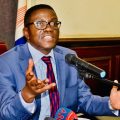
 Church of Uganda’s call to end land grabbing is timely and re-enforces earlier calls to investigate quack investors and their agents fueling the problem.
Church of Uganda’s call to end land grabbing is timely and re-enforces earlier calls to investigate quack investors and their agents fueling the problem.
 Land actors warn of looming violent conflicts due to escalating land grabbing in Sebei and Bugisu sub-regions.
Land actors warn of looming violent conflicts due to escalating land grabbing in Sebei and Bugisu sub-regions.
 Archbishop Kazimba Condemns Land Grabbing, Urges Govt to Act
Archbishop Kazimba Condemns Land Grabbing, Urges Govt to Act
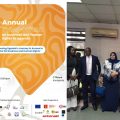 Land and environmental rights defenders, CSOs, scholars, and government to meet in Kampala to assess Uganda’s performance on the implementation of the UN Guiding principles on Business and Human Rights in Uganda.
Land and environmental rights defenders, CSOs, scholars, and government to meet in Kampala to assess Uganda’s performance on the implementation of the UN Guiding principles on Business and Human Rights in Uganda.

Women environmental rights defenders in Africa are at the most significant risk of threats and attacks – ALLIED New report

200 farmers demonstrate at parliament, worried about new seed monopoly

Uganda moves toward a Bamboo Policy to boost environmental conservation and green growth.

Will Uganda’s next government break the land-grabbing cycle?

Will Uganda’s next government break the land-grabbing cycle?

Land tenure security as an electoral issue: Museveni warns Kayunga land grabbers, reaffirms protection of sitting tenants.

Swedish pension fund drops TotalEnergies amid rising EACOP risks

Uganda moves toward a Bamboo Policy to boost environmental conservation and green growth.

Innovative Finance from Canada projects positive impact on local communities.
Over 5000 Indigenous Communities evicted in Kiryandongo District
Petition To Land Inquiry Commission Over Human Rights In Kiryandongo District
Invisible victims of Uganda Land Grabs
Resource Center
- Land And Environment Rights In Uganda Experiences From Karamoja And Mid Western Sub Regions
- REPARATORY AND CLIMATE JUSTICE MUST BE AT THE CORE OF COP30, SAY GLOBAL LEADERS AND MOVEMENTS
- LAND GRABS AT GUNPOINT REPORT IN KIRYANDONGO DISTRICT
- THOSE OIL LIARS! THEY DESTROYED MY BUSINESS!
- RESEARCH BRIEF -TOURISM POTENTIAL OF GREATER MASAKA -MARCH 2025
- The Mouila Declaration of the Informal Alliance against the Expansion of Industrial Monocultures
- FORCED LAND EVICTIONS IN UGANDA TRENDS RIGHTS OF DEFENDERS IMPACT AND CALL FOR ACTION
- 12 KEY DEMANDS FROM CSOS TO WORLD LEADERS AT THE OPENING OF COP16 IN SAUDI ARABIA
Legal Framework
READ BY CATEGORY
Newsletter
Trending
-

 MEDIA FOR CHANGE NETWORK2 weeks ago
MEDIA FOR CHANGE NETWORK2 weeks agoWill Uganda’s next government break the land-grabbing cycle?
-

 MEDIA FOR CHANGE NETWORK3 days ago
MEDIA FOR CHANGE NETWORK3 days agoUganda moves toward a Bamboo Policy to boost environmental conservation and green growth.
-

 MEDIA FOR CHANGE NETWORK2 weeks ago
MEDIA FOR CHANGE NETWORK2 weeks agoCOP30 : a further step towards a Just Transition in Africa
-

 MEDIA FOR CHANGE NETWORK2 weeks ago
MEDIA FOR CHANGE NETWORK2 weeks agoUnited States withdraws from core United Nations climate institutions
-

 MEDIA FOR CHANGE NETWORK18 hours ago
MEDIA FOR CHANGE NETWORK18 hours agoWomen environmental rights defenders in Africa are at the most significant risk of threats and attacks – ALLIED New report
-

 NGO WORK2 weeks ago
NGO WORK2 weeks agoViolations against Kenya’s indigenous Ogiek condemned yet again by African Court
-

 FARM NEWS1 day ago
FARM NEWS1 day ago200 farmers demonstrate at parliament, worried about new seed monopoly


